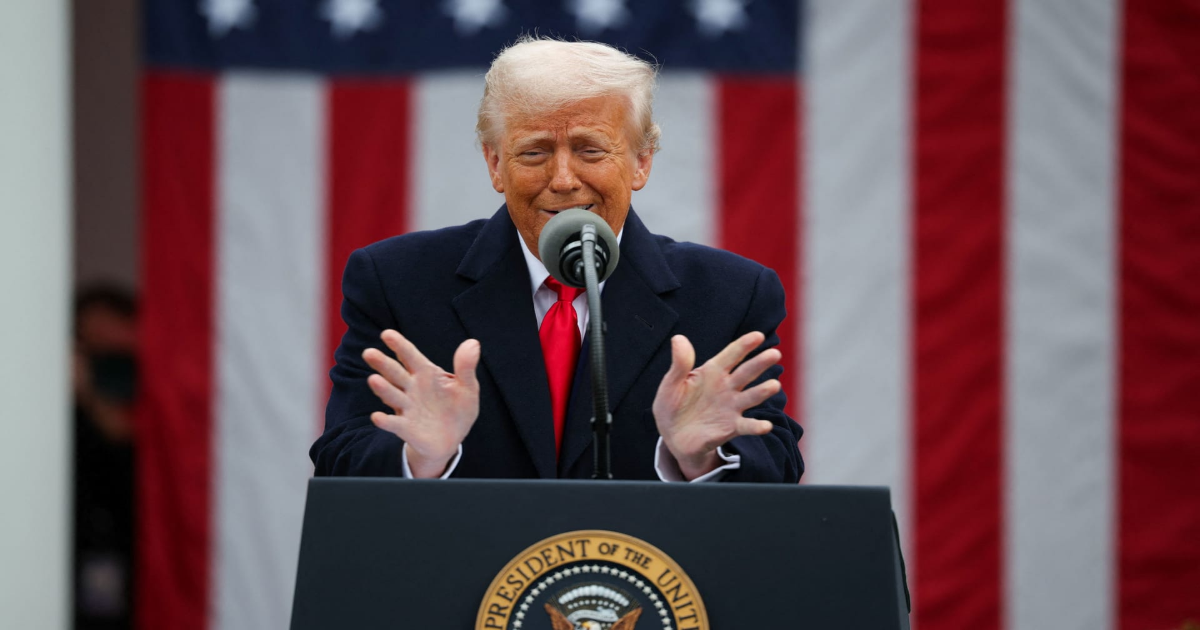U.S. President Donald Trump gestures as he delivers remarks on tariffs in the Rose Garden at the White House in Washington, D.C., U.S., April 2, 2025.
Psychologist Carl Jung believed in the “collective unconscious,” a universal mind all humanity is tapped into. In the context of the financial world, the stock market — as something ostensibly based on concrete numbers, but most of the time driven by instinctive hopes and fears — kind of works like that.
It is, in other words, essentially a tracker of sentiment. Nowhere is this function clearer than in the discrepancy between stocks’ moves during regular trading hours (modest climbs), prior to U.S. President Donald Trump’s triumphant unveiling of his tariff plan, and extended trading (precipitous plunges), when investors had time to digest — and suffer indigestion from — the sheer weight of the White House’s heavy tariffs on countries across the globe.
Trump teased leniency on tariffs days before revealing his cards. That quality of mercy was nowhere to be seen — the tariffs appear sweeping and severe. To call Trump’s tariff plan a seismic shift in the economic and financial world order might be an understatement. It could take time for price changes to filter into the economy. But the stock market, as the collective unconscious of investors, could register this shock in the coming days.
Tariffs for all
U.S. President Donald Trump announced Wednesday sweeping tariffs on more than 180 countries and territories. The plan imposes a 20% levy on the European Union, 46% on Vietnam, 32% on Taiwan and 34% on China — which comes on top of the 20% already existing — making the total tariff on Beijing 54%. There will also be a 10% baseline tariff on all U.S. imports. Get updates on ongoing tariff developments on CNBC’s live blog.
China and EU react
China’s Ministry of Commerce urged the U.S. to “immediately cancel” its unilateral tariff measures and vowed to take “resolute counter-measures” to safeguard its own rights and interests, according to a CNBC translation of a statement released Thursday. Likewise, the European Union is preparing more countermeasures against U.S. tariffs if negotiations fail, according to European Commission President Ursula von der Leyen.
Stock everywhere sink
U.S. stock futures plunged in extended trading Wednesday after Trump unveiled extensive tariffs. As of publication time, futures tied to the Dow Jones Industrial Average lost 2%, S&P 500 futures tumbled 2.7% and Nasdaq-100 futures slumped 3.52%. During regular trading, all three major indexes closed higher. Asia-Pacific markets followed Wall Street lower Thursday. Japan’s Nikkei 225 plummeted more than 3% and Hong Kong’s Hang Seng Index lost around 1.7%. Prices of gold, a safe haven asset, hit a fresh high.
Tech stocks slump
Apple shares sank 7% in late trading Wednesday and led a broader decline in tech stocks after Trump’s tariff announcement. Apple manufactures most devices in China. Nvidia, which produces new chips in Taiwan, fell 5.7%. U.S. Treasury Secretary Scott Bessent said Wednesday the sell-off in the stock market is due more to a sharp pullback in the biggest technology stocks instead of White House trade policies.
Tesla disappoints on deliveries, Chinese competitors sustain sales
Tesla on Wednesday reported 336,681 vehicle deliveries in the first quarter of 2025. That’s a 13% decline from a year ago, and is below the 360,000 and 370,000 deliveries expected by investors, according to StreetAccount. In China, electric carmakers Xiaomi, Xpeng and Leapmotor each delivered nearly 30,000 or more cars in March, roughly two times that of their fellow startup competitors. BYD remains the market leader in China by far.
[PRO] ‘Worse than the worst case scenario’
Trump’s extensive tariffs rollout on Wednesday was “worse than the worst case scenario,” Dan Ives, global head of technology research at Wedbush Securities, wrote in a Wednesday note following the White House announcement. Here are the stocks that Ives will be keeping an eye on because of heavy import levies.
The Exchange Square Complex, which houses the Hong Kong Stock Exchange, on Feb. 26, 2025.
DeepSeek AI excitement spills over to Hong Kong’s IPO market
Chinese companies are raring to go public in Hong Kong as global investors start to return to the region, following the news of DeepSeek’s artificial intelligence breakthrough in late January. It’s a level of excitement that has not been felt for more than three years, despite the overhang of U.S. trade tensions.
Six initial public offerings in Hong Kong raised more than 1 billion Hong Kong dollars ($130 million) in the first quarter — a jump from just one listing of that size in the year-ago period — according to KPMG.
Chinese bubble tea giant Mixue went public on March 3 in a highly oversubscribed Hong Kong listing. And in a sign of more to come, Chinese battery giant Contemporary Amperex Technology (CATL) filed in February for what could be Hong Kong’s largest IPO since 2021, when short-video company Kuaishou listed.
